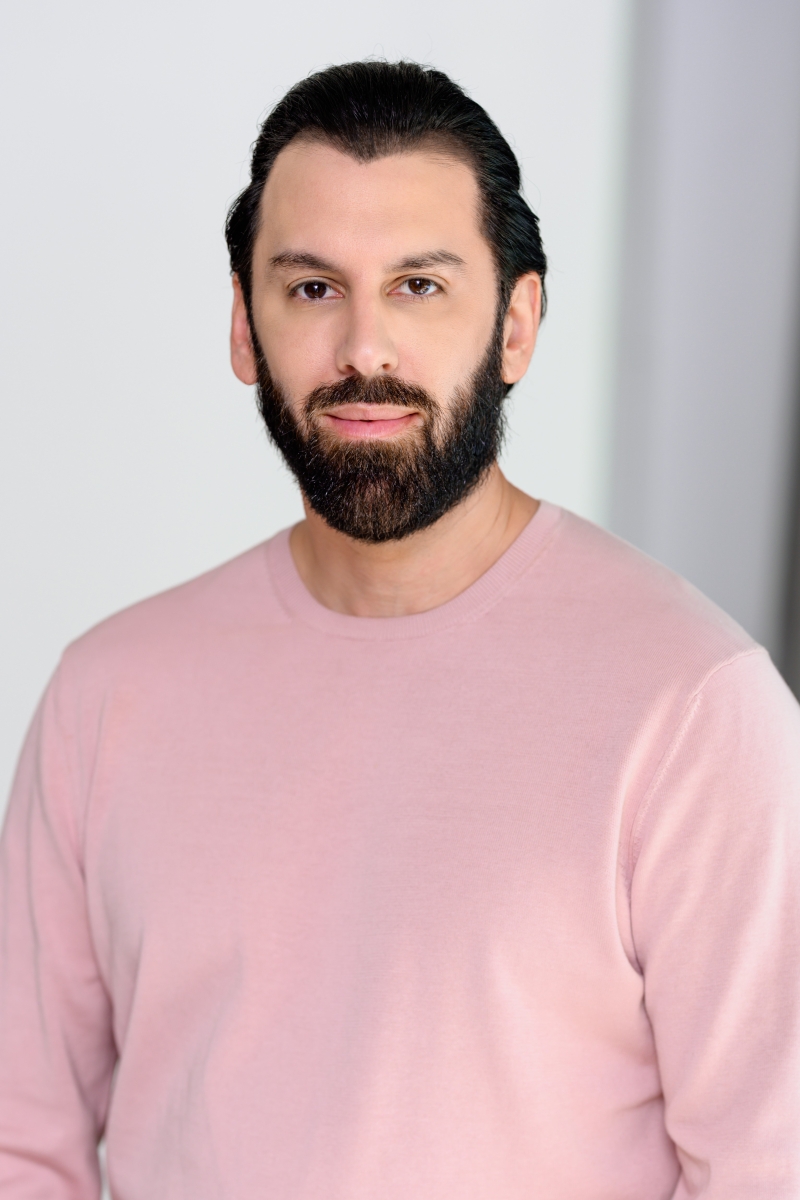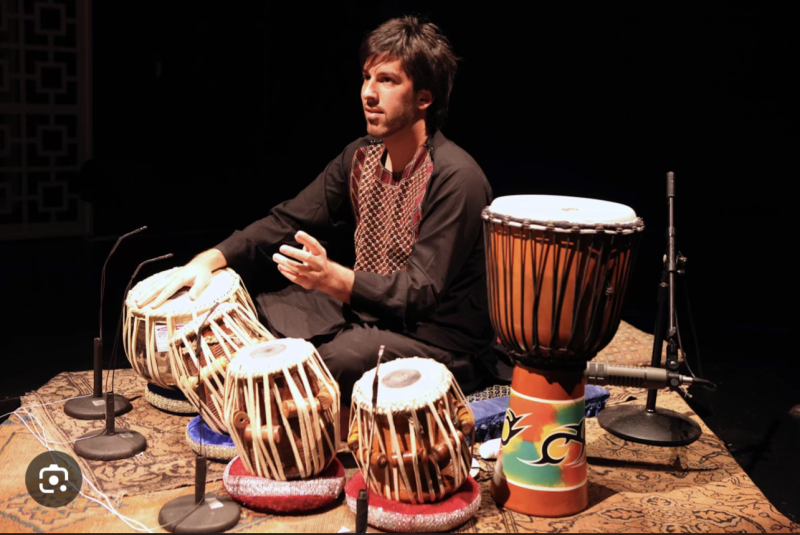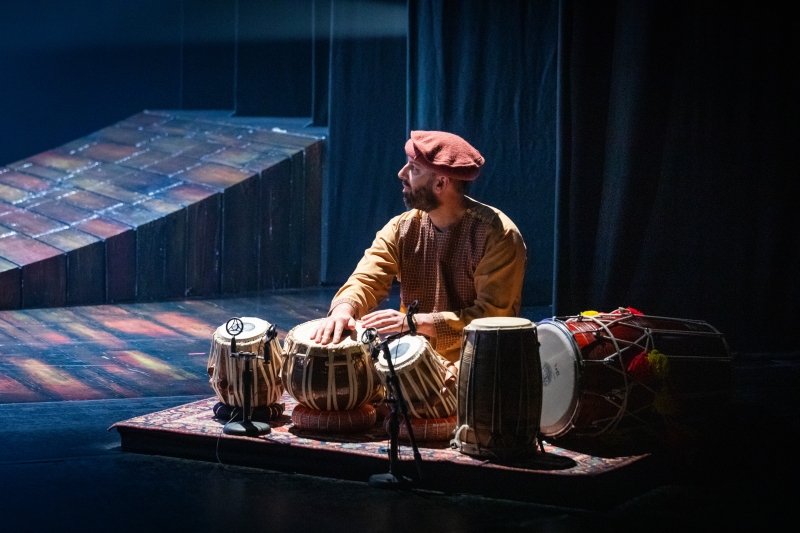Interview: Theatre Life with Salar Nader
The tabla virtuoso on his long association with The Kite Runner and more.

Today’s subject Salar Nader is currently living his theatre life as the Tabla Artist in the national tour of The Kite Runner. The show will conclude it’s tour in the Eisenhower Theater at Kennedy Center starting on June 25th and playing through June 30th.
Besides composing the score for The Kite Runner, Salar has performed in six different productions of the show including its premiere in 2009 at San Jose Repertory Theatre and the 2022 Broadway production. Salar’s music for The Kite Runner has been nominated for several awards including, “Outstanding Sound design or Composition” Betty Mitchell Awards & “Outstanding Score” 26th Sterling Awards. Salar also was the Musical director for the stage adaption of Indu Sunderasan’s The Twentieth Wife by Farah Yasmeen Shaikh.
Salar is hailed as Afghanistan’s preeminent tabla virtuoso, He is a percussionist, composer, producer, and educator. A senior disciple of the legendary Zakir Hussain, he currently tours with NEA Jazz Master Stanley Clarke.
Salar enjoys collaborating with celebrated film and TV composer, Michael Andrews. So far, they have joined forces on a couple blockbuster films, such as Paul Fieg’s The Heat and Mira Nair’s Reluctant Fundamentalist. Salar also composes music for Afghanistan’s TOLO television network. The Afghan network features the most watched TV shows, Afghan Star and The Voice. When Salar visits Kabul he is regularly featured as a guest judge and performs a tabla solo.
The Kite Runner is one of those shows that you might not have been considering taking your family to go see. I am here to tell you please take them and enjoy! The story will keep everyone interested from beginning to end and the virtuosic tabla playing and composition of Salar Nader compliments the action perfectly.
Salar Nader is one of those artists with a unique talent to be sure. The tabla is one of those instruments you don’t hear very often so when it is played by a top notch musician like Nader, you totally realize that this true artist is living his musical and theatrical life to the fullest.
What was it about the tabla that made you want to concentrate on it as your primary instrument?
As a young Afghan refugee, we didn't have much to play with, such as toys, etc. The one thing I did have, which was a huge blessing in disguise, was a pair of broken-down tablas. These were the best playpen I could ever ask for and my best friend, partner in crime, you name it. So, the concentration was there from the get-go. I absolutely loved the sound and playing along with my father's singing, or any cassette tape or CD being played in our home.
Where did you receive your training?
I started out jamming with family members; my father is a singer who sings in Dari/Farsi and Pashto. He also plays the rubab, the national instrument of Afghanistan. So my initial musical beginnings were with my father, Mohammad Nader. By the time I was 7 years old, it was decided by my parents that it was time to get me proper training and a teacher. In the late 1980s, Zakir Hussain was teaching in Berkeley, California, so my parents enrolled me in his summer classes. During that time, Zakirji would be teaching for three months, June, July, and August, on Tuesdays and Wednesdays. So that was my tabla version of summer camp!

The Kite Runner at San Jose Repretory Theatre.
Photo by Kevin Berne.
How did you get involved with The Kite Runner?
In 1994, I, along with my parents, attended an engagement party. Little did I know that this was the engagement party of a future New York Times best-selling author, Khaled Hosseini. So, while attending the party as a family member, I was allowed to join that night's musical sessions, which featured Afghanistan's Farida Mahwash, dubbed as our Barbara Streisand. When I met author Khaled Hosseini years later at a book signing in 2004, he mentioned that he still had the DVD or VHS tape of me performing at his engagement party. You could say that was like a pre-audition for The Kite Runner. During our conversation at the book signing, I asked if I could help in any way with creativity within The Kite Runner, and here we are almost 20 years later, working on my 6th production of the show.
How did you approach the scoring for The Kite Runner?
I created an original score for the world premiere of San Jose Repertory's The Kite Runner in 2009. Even prior to that, in 2005/2006, I met with my longtime creative partner, playwright Matthew Spangler. During the first iteration of the script, I was heavily involved in selecting places where music could enhance the storytelling, leading to the idea of incorporating a constant onstage Tabla player. This additional actor in the play provides a continuous musical underscore. With my background in musical training and experience accompanying North Indian Classical dance, specifically Kathak, I understood the role of the Tabla Player as a principal accompanying instrument that interacts with the storytelling dance. Just as a dancer can portray up to 20 different roles, I adjust my tabla playing to reflect the changes in character. For me, the Kite Fighting tournament is like a dance, with the various kites symbolizing different dancers. I adapt the pitches of my bass drum and the tuned and pitched tablas to convey varying shades and colors for the listener. Each ethnicity in Afghanistan, such as Pashtun, Hazaragi, Uzbek, Tajik, Baloch, and Nooristani, has its own unique musical character and style, with distinct rhythms, poetry, dialects, and beauty. I strive to capture this diversity in the music performed within The Kite Runner. Notably, for the 2022 Broadway Premiere, I incorporated Afghanistan's National Dance, the ATTAN, into the wedding scene—a circular and acrobatic dance. I also join the cast during this section, adding to the fun of the performance.

Photo by Bekah Lynn Photography.
Was it always the idea that you would perform in the show?
Absolutely. We believed that having a visible musician on stage throughout the production was essential to reflect Afghan musical traditions and enable the audience to experience the shifts in time, place, and atmosphere. I recall attending Wicked in 2007 and being inspired by the drum overture. This led to the realization that we could have an overture and Tabla solo before each performance. I take the stage around 10-12 minutes before the first scene, performing a Peshkar introductory movement to the Tabla solo, allowing the audience to connect with the language and tones of my instrument.
Why do you think The Kite Runner resonates with its audiences?
The Kite Runner is a human story that is universal but also specific to Afghan people. Everyone on this planet can recall their best friend, brother, sister, or reminisce about the first time they fell in love, like Soraya and Amir. Audiences can also connect with Baba's story—a successful businessman who loses everything to war and has to rebuild his life from scratch in a new country as a refugee, raising a son on his own. The childhood tale of Amir and Hassan strikes a chord with people of all ages, as our kite fighting tournaments are just as thrilling as summer baseball or tackle football.
After this current tour of The Kite Runner finishes, what does the rest of 2024 hold in store for you?
Following the conclusion of the current tour, I will embark on my fall tour with my project primarily focused on Afghan folkloric music and classical music, alongside my longtime musical collaborator and rubab virtuoso, Homayoun Sakhi. We will tour nationally, with stops in cities such as Oberlin, Rochester, Toronto, NYC, and D.C. Additionally, I will be touring with my musical mentor, four-time Grammy Award-winning artist Maestro Stanley Clarke, and the band's new record is set to be released next month. I will also make a couple of debuts at the Festival of Tabla at SOKA University on July 27th and 28th and launch my 2024/25 Salar Nader Tabla Foundation scholarship, powered by Rhea Designs Inc. The remainder of 2024 is packed with exciting events, and I look forward to performing in a city near you!
Special thanks to Kennedy Center's Senior Press Represenitive Brittany Laeger for her assistance in coordinating this interview.
Theatre Life logo designed by Kevin Laughon.
Comments
Videos


.gif)